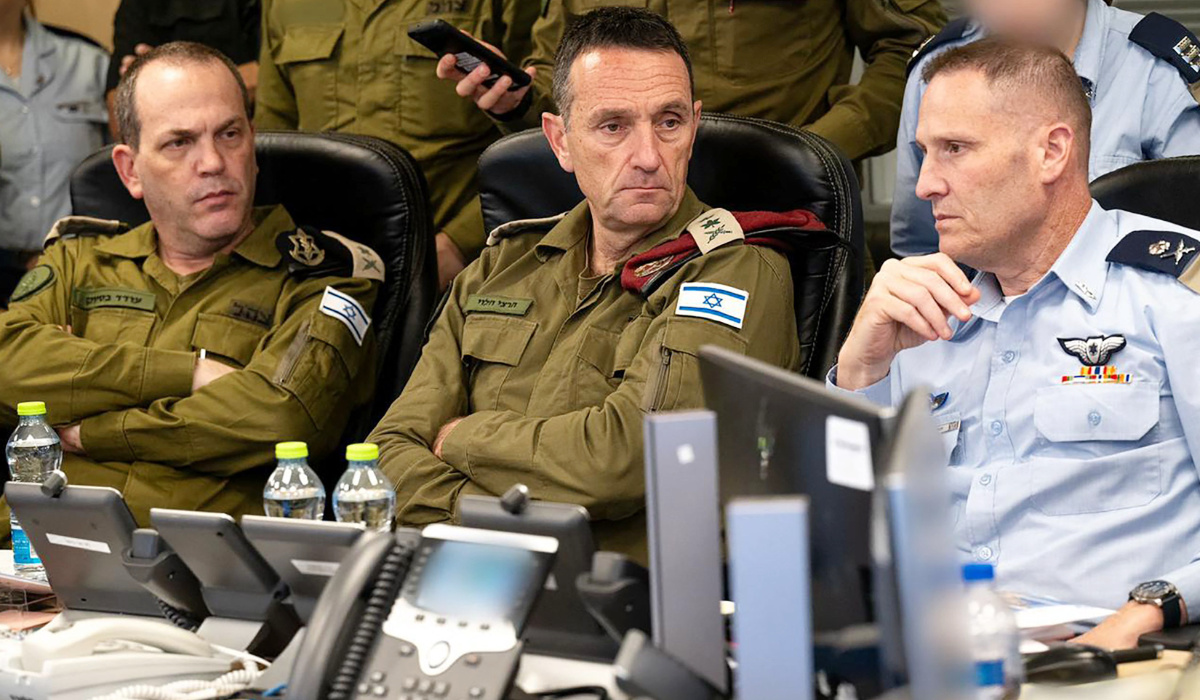JERUSALEM: Israel’s military chief said on Monday his country would respond to Iran’s weekend missile and drone attack amid calls for restraint by allies anxious to avoid an escalation of conflict in the Middle East.
Prime Minister Benjamin Netanyahu summoned his war cabinet for the second time in less than 24 hours to weigh how to react to Iran’s first-ever direct attack on Israel, a government source said.
Israel’s military Chief of Staff Herzi Halevi said the country would respond, but provided no details.
“This launch of so many missiles, cruise missiles, and drones into Israeli territory will be met with a response,” he said at the Nevatim Airbase in southern Israel, which sustained some damage in Saturday night’s attack.

The head of the military, Lieutenant General Herzi Halevi (C), attending early on April 14, 2024 a meeting at the Israeli Air Force Operations Center in Kirya in Tel Aviv with the commanding officers of the Israeli Air Force, the operations directorate and the intelligence directorate. (AFP)
Iran’s attack — launched in retaliation for a suspected Israeli airstrike on its embassy compound in Damascus on April 1 — has increased fears of open warfare between Israel and Iran and heightened concerns that violence rooted in the Gaza war is spreading further in the region.
Wary of the dangers, President Joe Biden told Netanyahu the United States will not take part in any Israeli counter-offensive against Iran, officials said on Sunday.
Since the start of the war in Gaza on Oct. 7, clashes have erupted between Israel and Iran-aligned groups in Lebanon, Syria, Yemen and Iraq. Israel said four of its soldiers were wounded hundreds of meters inside Lebanese territory overnight.
It appeared to be the first such known incident since the Gaza war erupted, although there have been months of exchanges of fire between Israel and Lebanon’s armed group Hezbollah.
“We’re on the edge of the cliff and we have to move away from it,” Josep Borrell, the European Union’s foreign affairs chief, told Spanish radio station Onda Cero. “We have to step on the brakes and reverse gear.”
French President Emmanuel Macron, German Chancellor Olaf Scholz and British Foreign Secretary David Cameron made similar appeals. Washington and United Nations Secretary-General Antonio Guterres have also issued calls for restraint.
White House national security spokesman John Kirby declined on Monday to say during a briefing whether Biden urged Netanyahu in talks on Saturday night to exercise restraint in responding to the attack.
“We don’t want to see a war with Iran. We don’t want to see a regional conflict,” said Kirby, adding that it was up to Israel to decide “whether and how they’ll respond.”
Countries including France, Belgium and Germany summoned the Iranian ambassadors. The French foreign ministry said France was working with its partners to de-escalate the situation.
Russia has refrained from criticizing its ally Iran in public over the strikes but expressed concern about the risk of escalation on Monday and also called for restraint.
“Further escalation is in no one’s interests,” Kremlin spokesman Dmitry Peskov said.
Iran mounted its attack after the April 1 killing in Damascus of seven Iranian Revolutionary Guards officers, including two senior commanders. Israel neither confirmed nor denied carrying out the attack.
Iran’s retaliatory attack, involving more than 300 missiles and drones, caused modest damage in Israel and wounded a 7-year-old girl. Most were shot down by Israel’s Iron Dome defense system and with help from the US, Britain, France and Jordan.
In Gaza itself, where more than 33,000 Palestinians have been killed in the Israeli offensive according to Gaza health ministry figures, Iran’s action has drawn applause.
Israel began its campaign against Hamas after the Palestinian militant group attacked Israel on Oct. 7, killing 1,200 people and taking 253 hostages by Israeli tallies.
G7 MULLS SANCTIONS
In Washington, Biden reiterated US commitment to Israel’s security ahead of a meeting with Iraqi Prime Minister Mohammed Shia Al-Sudani.
Sudani, speaking alongside Biden, said their views may be divergent about what is happening in the region but they wanted to stop the conflict from expanding.
British Prime Minister Rishi Sunak said the Group of Seven major democracies were working on a package of coordinated measures against Iran.
“I spoke to my fellow G7 leaders, we are united in our condemnation of this attack,” Sunak said in parliament.
Italy, which holds the rotating presidency of the G7, said it was open to new sanctions against individuals engaged against Israel.
In an interview with Reuters, Italian Foreign Minister Antonio Tajani said new sanctions would need the backing of all the G7. He suggested any new measures would be focused on individuals rather than whole nations.
“If we need to have more sanctions for people clearly engaged against Israel, supporting for example terrorism, supporting Hamas, it is possible to do it,” Tajani said.
Iran’s attack has caused travel disruption, with at least a dozen airlines canceling or rerouting flights, and Europe’s aviation regulator reaffirming advice to airlines to use caution in Israeli and Iranian airspace.
Iraqi Airways announced a resumption of flights between Iraq and Iran on Tuesday.
Israel remained on high alert, but authorities lifted some emergency measures that had included a ban on some school activities and caps on large gatherings.
Iranian Foreign Minister Hossein Amirabdollahian said Tehran had informed the United States that the attack on Israel would be limited and for self-defense, and that regional neighbors had been informed of the planned strikes 72 hours in advance.
Iranian Foreign Ministry spokesperson Nasser Kanaani said on Monday, however, that no pre-arranged agreement was made with any country prior to the weekend attack.
Kirby said that Iran did not warn the United States in advance of the attack’s timeframe or targets, calling reports that Tehran had done so “categorically false.”
























